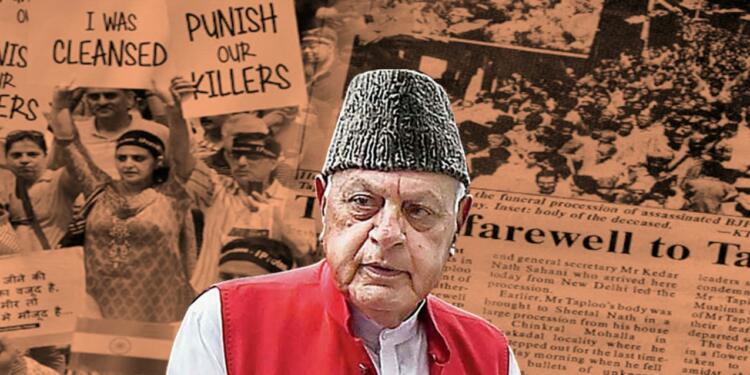Farooq Abdullah finds himself at the centre of a flurry of controversies yet again. The National Conference patriarch, who has served as chief minister of the erstwhile state of Jammu and Kashmir, has much to answer for. The film ‘The Kashmir Files’ has stirred a public debate in India vis-à-vis the brutal genocide of Kashmiri Hindus that took place in the late 1980s and peaked in 1990-91. Farooq Abdullah was chief minister of Jammu and Kashmir until 18 January 1990. On January 19 of that year, an all-out pogrom against Kashmiri Hindus was initiated.
Farooq’s son, Omar Abdullah is agitated these days, mostly due to the uncomfortable truths shown in the film. Abdullah Junior said, “But the fact is that many lies have been projected in the film and the biggest one is that it has been wrongly shown that there was an NC government. The fact is that it was Governor’s rule in 1990 in J&K when Kashmiri Pandits left Kashmir. At the Centre, it was BJP-backed government headed by VP Singh.”
Farooq Abdullah and the Exodus
Omar Abdullah wants you to believe that the genocide of Kashmiri Hindus and minorities was sudden. That it had no precursors; that it came as a surprise. That’s a lie. The systemic targeting and killing of Kashmiri Hindus had been on before 1990 as well. That part of history, however, has never been told to Indians – which is why Islamists and their ring leaders are today so agitated.
Why did Farooq Abdullah resign as chief minister of J&K just a day before an all-out genocide was initiated against Kashmiri Hindus? Did he want to give the terrorists a free run? Did he not want to be at the helm of affairs when such a genocide began? Did Farooq Abdullah, despite knowing what was about to come, not take any action against Kashmiri Islamists?
Here’s an even more shocking detail about Farooq Abdullah’s illustrious tenure as chief minister. According to Shesh Paul Vaid, who has served as Jammu and Kashmir Police Director General of Police, the first batch of 70 terrorists trained by ISI was arrested by Jammu and Kashmir Police. However, the Farooq Abdullah-led government got these dreaded terrorists released, and they went on to brutalise Kashmiri Hindus and minorities almost immediately.
Some of the terrorists whom the former DGP mentioned include Mohammed Afzal Sheikh of Trehgam, Rafiq Ahmed Ahangar, Mohammad Ayub Najar, Farooq Ahmed Ganai, Ghulam Mohammed Gujri, Farooq Ahmed Malik, Nazir Ahmed Sheikh and Ghulam Mohi-Ud-Din Teli. Mr Vaid asked, “Could this have been possible without the knowledge of the Union Government of 1989?”
The BJP has fired a salvo at the Abdullah clan, pointing at their complicity in the violence unleashed in Kashmir in the 80s and 90s. National in-charge of the BJP Information and Technology Department, Amit Malviya tweeted, “Which part of Kashmir Files does Omar find untrue? The fact that Farooq Abdullah, his father, resigned as CM on 18 Jan 1990, and as if on cue the genocide was unleashed on hapless Kashmiri Hindus starting 19 Jan 1990? That he ordered the release of 70 ISI trained dreaded terrorists?
The Rigged Elections of 1987
Farooq Abdullah has also been accused of poll rigging by a very senior leader of the Modi government. Union Minister Dr Jitendra Singh on Thursday said that Kashmir’s turning point was “the rigged assembly election of 1987.”
The Union Minister in charge of the Prime Minister’s Office said, “In order to ensure that Farooq Abdullah returned as Chief Minister with comfortable majority, the (then) state machinery had manoeuvred to secure the defeat of Muslim United Front (MUF) candidates, while the Centre remained a mute spectator because of the Rajiv- Farooq Accord and a tactical understanding between the National Conference and Congress.”
Read more: Farooq Abdullah should be booked for his seditious rants
He added, “Soon thereafter uproarious surges of discontent with slogans of Azadi began to be heard and this discontent came handy to terrorist outfits like Jammu Kashmir Liberation Front (JKLF), who began to put up threatening advertisements and terrorising posters on the streets of Valley.”
Farooq Abdullah somehow seems to be a central figure in the exodus of Kashmiri Hindus out of their homeland. Yet, he has escaped being held accountable so far. Now, his deeds are being called into question, and the only way to get to the bottom of his role in the crisis of Kashmir is if a high-level investigation is launched against him and his party.




















